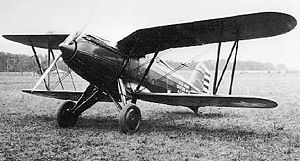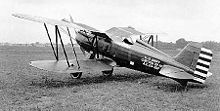Curtiss XP-10 Video - Picture

|
|
Curtiss XP-10
XP-10

Picture - The sole Curtiss XP-10 (s/n 28-387)
Role: Biplane fighter
Manufacturer: Curtiss
Retired: 1928
Status: Cancelled
Primary user: United States Army Air Corps
Number built: One
The Curtiss XP-10 was an American experimental biplane fighter tested by the United States Army Air Corps.
Design and development
Ordered 18 June 1928, it was intended to be fast and maneuverable enough to win a dogfight. The XP-10 used a gull wing top wing, joined at the fuselage; this offered much better pilots view than the traditional biplane configuration. Coincidentally, this also permitted the wing and fuselage to meet at the optimum angle for minimizing drag. The wings were plywood-covered (rather than doped fabric, as used in World War I), and the fuselage was fabric-covered steel tubing.
The XP-10 used a 600 hp (447 kW) Curtiss V-1570 Conqueror water-cooled V12 engine. To overcome the drag of a radiator (a quite serious issue before the introduction of ethylene glycol), Curtiss incorporated it into the upper wing. It was formed of corrugated brass sheets through which cooling water was run. While ingenious, this introduced technical and mechanical problems, especially, in a combat aircraft, vulnerability to enemy fire.
Operational history
Delivered to the Army Air Corps in August 1928, the XP-10 first flew in September. Despite excellent maneuverability, with the XP-10 proving superior to the Curtiss Hawk in testing, persistent problems with cooling, and the plumbing of the surface radiator, led to the XP-10 being abandoned.

Picture - Curtiss XP-10
Operators
United States
United States Army Air Corps
Specifications
Data from U.S.Fighters, Lloyd Jones, Aero Publishers 1975, Fighters of the United States Air Force.
General characteristics
Crew: one pilot
Length: 24 ft 6 in (7.47m)
Wingspan: 33 ft (10.06 m)
Height: 10 ft 10 in (3.30 m)
Wing area: 238 ft² (21.1 m²)
Empty weight: approx. 2,900 lb (1,315 kg)
Max takeoff weight: 3,400 lb (1,542 kg)
Powerplant: 1x— V-1570 Conqueror water-cooled 12-cylinder vee, 600 hp (448 kW)
Performance
Maximum speed: 150 knots (173 mph, 279 km/h)
Cruise speed: 113 knots (130 mph, 209 km/h)
Range: 195 mi (170 NM, 314 km)
Service ceiling: 19,610 ft (5,977 m)
Rate of climb: 1,940 ft/min (9.86 m/s)
Armament
none installed (one 0.3 in and one 0.5 in machine guns planned
Bibliography
Dorr, Robert F. and David Donald. Fighters of the United States Air Force. London: Temple, 1990. ISBN 0-600-55094-X.
Green, William. War Planes of the Second World War, Fighters. Volume Four. Garden City, NY: Doubleday & Company, 1973.
Jones, Lloyd S. U.S. Fighters: 1925-1980s. Fallbrook, California: Aero Publishers, Inc., 1975. ISBN 0-8168-9200-8.
Curtiss XP-10 Pictures
More aircraft.
Source: WikiPedia